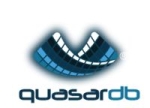 |
|||||
Home > News > Members and Partners News > quasarDB
| October 11, 2017 - Tellmeplus, the specialist of Artificial Intelligence applied to Big Data, and QuasarDB, provider of a software storage technology optimized for real-time data analysis, announced today a strategic technology partnership. Under the terms of the agreement, Tellmeplus will be embedding the QuasarDB time series database into its Predictive Objects platform, enabling the deployment of next generation predictive models into any connected object or system. QuasarDB is a high-performance, distributed, column-oriented database with native time series support. The database can reliably ingest millions of points per second and aggregate billions of lines per second, making sure it can handle even the most extreme time series use cases while enabling interactive work on data, regardless of the amounts stored. With transparent scalability from very large and dense time series to smaller ones, QuasarDB can be deployed seamlessly on any platform, from memory- and CPU- constrained connected objects to edge computing gateways or cloud servers. “Embedding a scalable time serie oriented data storage in our predictive analytics solution is key to an efficient deployment of predictive models on any type of object or platform,” indicated Jean-Michel Cambot, founder and chief strategist at Tellmeplus. “Transfers, computations of aggregations in QuasarDB are so fast and require so little memory that Predictive Objects will be able to compute their own sequences and expose them to the embedded model with the same sequencing power, regardless of where they are deployed.” Edouard Alligand, founder and CEO of QuasarDB, added: “Tellmeplus’ Predictive Objects platform is a game-changer in artificial intelligence, with its ability to deploy and run predictive models inside the objects, where the data is produced and where insight is needed the most. We are very excited about QuasarDB enabling them to be even more efficient.” The first version of Predictive Objects that natively embeds QuasarDB is expected to be released in November 2017. |
| November 27, 2014 -
In November , 3 new members join the team :
And quasardb moves into new offices , 24 Rue Feydeau , Paris 75002 For any information , please contact Jean-Claude Tagger , COO at jct@quasardb.net |
| September 3, 2014 -
The high performance databases publisher Bureau 14 has raised 1 million dollars (750 000 euros) from Newfund. This will help the Parisian-based start-up company to speed up its growth on the very promising Big Data market. Bureau 14 designed and markets Quasardb, a groundbreaking technology. Quasardb is a software solution which provides an efficient, reliable and performing response to the challenges of massive data processing. Such challenges gained momentum over the past few years as a result of the skyrocketing rise in the number and variety of the output of digital data. As stated by Edouard Alligand, founder and CEO of Bureau 14: « in the digital age, the ability to access and process an ever increasing volume of data represents a major competitiveness issue for all companies. Quasardb is a true disruptive technology in this field, well suited to the financial and telecom sectors since it allows for a real time manipulation of massive databases». « In the digital age, the increase in computational power is not the only factor of the increase in the speed of data processing. In order to fully exploit them, data must be easily and quickly accessed. And this is what Bureau 14 provides, in an elegant and highly efficient manner" states CA. Morand, Newfund associate. The fund raising operation provides Bureau 14 the means to pursue its development in optimum conditions, particularly abroad, so as to become a key player in the Big Data market. |
QuasarDB is a software publisher founded in 2008 by Edouard Alligand and joined in 2012 by Jean-Claude Tagger. QuasarDB is a high-performance, distributed, column-oriented database with native time series support. It has been designed to handle even the most extreme use cases and can ingest reliably millions of points per second while aggregating billions of lines per second on a single commodity server. This way, analysts can work interactively on their data instead of waiting for long batches to end.
